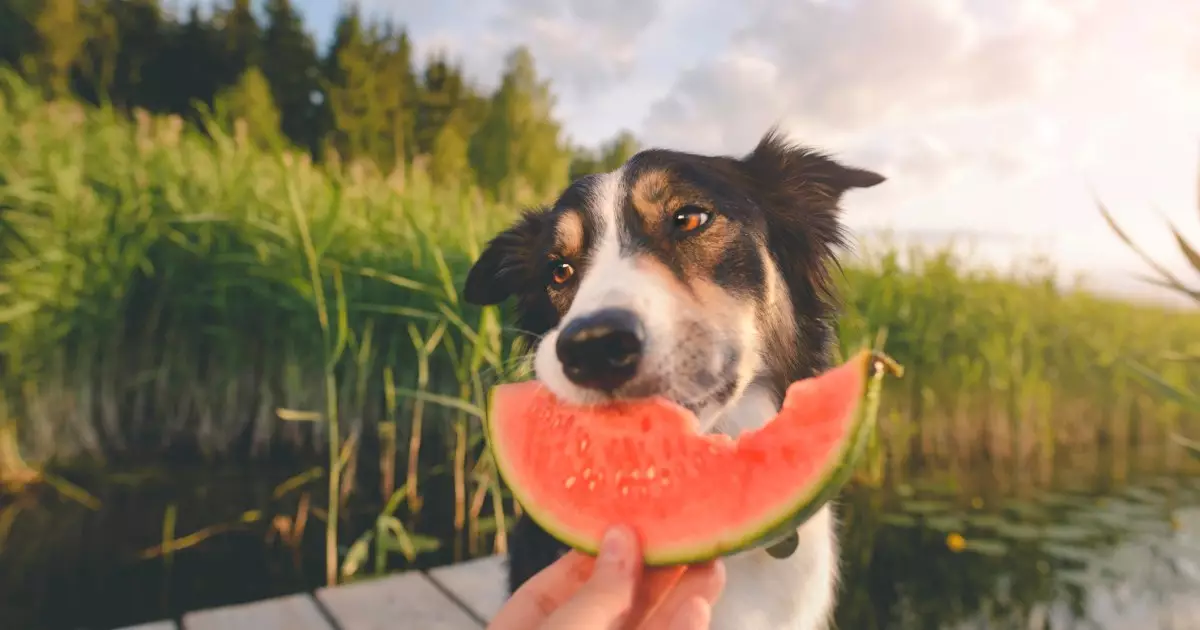Watermelon is celebrated as a quintessential summer fruit, offering not only a burst of refreshing sweetness but also a treasure trove of health benefits. With its high water content, it can be an excellent hydration source, particularly on sweltering days. For dog owners, the question often arises: can our furry friends partake in this juicy delight? The answer, while primarily affirmative, warrants careful scrutiny.
Many are unaware that watermelon is packed with vitamins A, B6, and C, as well as potassium—nutrients that contribute positively to a dog’s overall health. Furthermore, the fibrous nature of the fruit aids digestion and cushions the sugar content, ensuring it doesn’t cause rapid spikes in blood sugar. Considered a low-calorie and fat-free snack, watermelon stands as a healthier alternative to conventional store-bought dog treats, which might be laden with questionable ingredients.
However, it is imperative to remember that moderation is key. Like any delicacy, overindulging in watermelon can lead to gastrointestinal distress in dogs, showcasing symptoms such as diarrhea and stomach aches. Recognizing the limitations of their digestive systems is crucial, as we might overestimate their ability to consume this sweet treat.
The Dangers of Seeds and Rinds
While watermelon flesh can be a safe snack for dogs, caution must be exercised regarding its seeds and rind. Though the occasional seed may not lead to immediate harm, numerous seeds can cause significant health issues, potentially resulting in an intestinal blockage. Similarly, the firm texture of watermelon rind can be problematic. If swallowed whole, it can obstruct your dog’s digestive tract, leading to serious discomfort, lethargy, or bloating.
It’s essential for pet owners to remain vigilant. If you notice signs of an obstruction—vomiting, abdominal pain, or abnormal bowel movements—immediate veterinary care is necessary to prevent life-threatening conditions. These potential hazards are an important consideration for any dog enthusiast who wishes to share this summer delight with their companion.
Steering Clear of Processed Alternatives
In our quest to treat our pets, we may be tempted to turn to processed foods, such as artificially flavored watermelon treats. However, these often contain excessive sugars, chemicals, and artificial sweeteners—some of which, like xylitol, pose serious risks to dogs, even in minute quantities. These alternatives can lead to obesity and diabetes over time, far outweighing any benefit derived from the fruit.
To provide your dog with a safe snack, it’s advisable to stick with natural watermelon, freshly prepared to eliminate seeds and rind. Simple preparation methods, such as cutting it into bite-sized pieces, can help avoid dangers while ensuring that your dog enjoys a tasty treat. Freezing the fruit can also offer a cool option, making it even more appealing and refreshing on hot days.
Consulting a Professional: The Key to Safe Treating
Before introducing watermelon or any new human food into your dog’s diet, consulting your veterinarian is a wise decision. Every dog has unique dietary requirements that depend on age, health, and metabolic rate. Your vet can guide you on appropriate serving sizes based on these factors, ensuring your canine companion enjoys watermelon without distress.
Incorporating watermelon, when done right, can enhance your dog’s diet with beneficial nutrients while doubling as a satisfying treat during warmer weather. The joy that a small piece of this hydrating fruit can bring to your dog is unmatched; however, neglecting the proper precautions can lead to unwanted outcomes. Proper preparation and moderation can turn this summery treat into an enjoyable experience for both you and your pup, creating treasured moments while keeping health risks at bay.
Adopting a cautious approach not only ensures that your furry friend remains safe but also maximizes the pleasure of pet ownership, transforming simple acts—such as sharing a slice of watermelon—into profound, memorable experiences. Always prioritize your dog’s health, ensuring that the joys of dog ownership continue to enrich your lives together.

